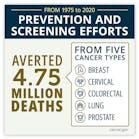New research published in the Journal of the American College of Surgeons (JACS) describes how surgery for colorectal cancer—the third most commonly diagnosed cancer—was considerably disrupted during the pandemic.
In a large-scale retrospective analysis of 105,517 colorectal cancer cases, researchers noted a 17.3% overall decline in colorectal cancer surgeries in 2020 compared to 2019. There was also a notable shift toward more advanced disease in the same period, with researchers finding that patients who underwent surgery in 2020 were more likely to have advanced stages of colorectal cancer, which is harder to treat and cure.
Using the National Cancer Database (NCDB), the team reviewed cases of all adult patients who underwent operations for colon and rectal cancer from January 1, 2019, through December 31, 2020, in hospital systems that contribute to the NCDB. The NCDB, an oncology research database jointly operated by the American College of Surgeons and the American Cancer Society, captures approximately 74% of all newly diagnosed cancer cases.
Patients who had surgery were divided into two groups: pre-COVID, which included patients operated on in 2019; and the COVID group, which included patients operated on in 2020. The researchers further analyzed the data by type of surgery, age, sex, race, ethnicity, income, insurance status, and other variables.
Other Key Study Findings
- Operations for rectal cancer decreased by 21% and 16% for colon cancer, corresponding to an overall 17.3% decrease in colorectal cancer operations during the first year of the pandemic.
- Patients in the COVID group had a significantly lower rate of early-stage cancer (35.5% vs. 38.2%) and a significantly higher rate of advanced tumors (19.2% vs. 15.7%), which are associated with increased mortality risk.
- Black patients, patients on Medicaid, and those who lacked insurance were affected by more advanced colon and rectal cancer stages, and low-income patients had worse colon cancer stages.
- However, researchers did not find any significant delays in time to treatment once a patient was diagnosed with colorectal cancer.
The researchers attribute these findings to multiple factors, including an overall reduced number of colorectal cancer screenings in 2020, delays in colonoscopies, and widespread avoidance of medical care due to the fear of contracting COVID-19. Additionally, the pandemic may have exacerbated known disparities in cancer care that frequently impact vulnerable patient populations, including Black patients and patients without insurance.





